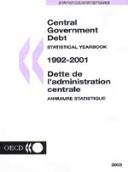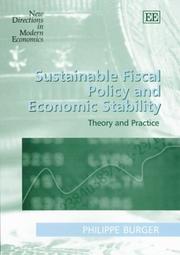| Listing 1 - 10 of 138 | << page >> |
Sort by
|
Book
ISBN: 9055161942 Year: 2003 Publisher: Amsterdam NIBE-SVV
Abstract | Keywords | Export | Availability | Bookmark
 Loading...
Loading...Choose an application
- Reference Manager
- EndNote
- RefWorks (Direct export to RefWorks)
Public debt --- Europe
Periodical
ISSN: 19987471 1998748X Year: 2003 Publisher: Paris
Abstract | Keywords | Export | Availability | Bookmark
 Loading...
Loading...Choose an application
- Reference Manager
- EndNote
- RefWorks (Direct export to RefWorks)
This annual report presents comprehensive statistics on the gross external debt of 171 developing countries and countries in transition. The 2003 edition has been enhanced with additional series providing more detailed breakdowns of categories of debt and time series data going back to end 1998. These figures are compiled by the OECD, largely on the basis of creditor sources. All figures are shown in US dollars. The External Debt Statistics database is included in OECD's International Development Statistics CD-ROM, and is available on line via www.SourceOECD.org
Public debt --- International finance --- Developing countries
Book
ISBN: 8885401872 Year: 2003 Publisher: Florence UNICEF
Abstract | Keywords | Export | Availability | Bookmark
 Loading...
Loading...Choose an application
- Reference Manager
- EndNote
- RefWorks (Direct export to RefWorks)
Migration. Refugees --- National wealth --- Age group sociology --- Public debt --- Hygiene. Public health. Protection --- Sociology of health --- Eastern and Central Europe

ISBN: 1136520651 1136520724 131501694X 041531397X 0415489032 9781136520655 9781315016948 9781136520792 1136520791 9781136520723 9780415489034 0415313961 9780415313971 Year: 2003 Publisher: London
Abstract | Keywords | Export | Availability | Bookmark
 Loading...
Loading...Choose an application
- Reference Manager
- EndNote
- RefWorks (Direct export to RefWorks)
'Dalton has succeeded in expressing general economic concepts in simple language' The Economist.
The 1971 edition of this famous textbook includes recent material to the general survey on the theory of taxation, other forms of public revenue, public expenditure and public debts. There are chapters on modern theories of budgetary policy and the controversial cheap money policy, pursued by the author when he was in charge of the British Treasury from 1945-1947.
Debts, Public. --- Finance, Public. --- Cameralistics --- Public finance --- Debts, Government --- Government debts --- National debts --- Public debt --- Public debts --- Sovereign debt --- Currency question --- Debt --- Bonds --- Deficit financing --- Public finances

ISBN: 1280170069 9786610170067 9264101756 9264101748 Year: 2003 Publisher: Paris, Cedex, France : OECD,
Abstract | Keywords | Export | Availability | Bookmark
 Loading...
Loading...Choose an application
- Reference Manager
- EndNote
- RefWorks (Direct export to RefWorks)
Governments are amongst the major issuers of debt instruments in the global financial market. The present volume provides quantitative information on central government debt instruments to meet the analytical requirements of users such as policy makers, debt management experts and market analysts.
Debts, Public -- OECD countries -- Statistics -- Periodicals. --- Debts, Public -- OECD countries. --- Debts, Public -- Statistics -- Periodicals. --- Debts. --- Debts, Public. --- Debts, Government --- Government debts --- National debts --- Public debt --- Public debts --- Sovereign debt --- Debt --- Bonds --- Deficit financing
Book
ISBN: 1462344844 1452741131 1282111760 9786613803955 1451901690 Year: 2003 Publisher: Washington, D.C. : International Monetary Fund,
Abstract | Keywords | Export | Availability | Bookmark
 Loading...
Loading...Choose an application
- Reference Manager
- EndNote
- RefWorks (Direct export to RefWorks)
To monitor fiscal sustainability, this paper proposes a recursive algorithm derived from the law of motion of the debt-to-GDP ratio, subject to a government reaction function that links convergence to the targeted debt ratio with primary fiscal surpluses. Based on quarterly estimates of this algorithm in the 1990s, 12 developed and developing countries are ranked according to their degree of sustainability. For a number of countries, the paper finds evidence of causality between the fiscal policy stance and growth-adjusted real interest rates.
Macroeconomics --- Public Finance --- Fiscal Policy --- National Government Expenditures and Related Policies: General --- Debt --- Debt Management --- Sovereign Debt --- Public finance & taxation --- Fiscal sustainability --- Expenditure --- Fiscal stance --- Fiscal policy --- Public debt --- Expenditures, Public --- Debts, Public --- United States
Book
Year: 2003 Publisher: Washington, D.C., The World Bank,
Abstract | Keywords | Export | Availability | Bookmark
 Loading...
Loading...Choose an application
- Reference Manager
- EndNote
- RefWorks (Direct export to RefWorks)
This paper analyzes institutional arrangements for public debt management by reviewing the experience of OECD countries during the late 1980s and 1990s. It discusses principal-agent issues arising from the delegation of authority from the Minister of Finance to the debt management office and describes how countries have designed governance structures and control and monitoring mechanisms to deal with these issues. The paper also discusses what lessons emerging market countries and transition countries can draw from the experience of advanced OECD countries. The OECD experience clearly indicates that-regardless of whether the debt management office is located inside or outside the Ministry of Finance-four issues are of vital importance: Giving priority to strategic public policy objectives rather than tactical trading objectives; Strengthening the institutional capacity to deal with financial portfolio management and with the public policy aspects of debt management; Modernizing debt management; Creating mechanisms to ensure successful delegation and accountability to the Ministry of Finance and Parliament. This paper-a joint product of the Office of the Senior Vice President and Chief Economist, Development Economics, and Public Debt Management Group, Banking, Capital Markets, and Financial Engineering Department-is part of a larger effort in the Bank to analyze the institutional dimentions of effective government policy.
Bank Policy --- Banks and Banking Reform --- Central Bank --- Corporate Governance --- Debt Markets --- Emerging Market --- Emerging Market Countries --- Emerging Market Economies --- Emerging Markets --- Exchange --- Exchange Rate --- External Debt --- Finance --- Finance and Financial Sector Development --- Financial Literacy --- Financial Management --- Financial Portfolio --- Financial Risks --- Institutional Capacity --- International Economics & Trade --- Monetary Policy --- Portfolio Management --- Principal-Agent Problem --- Private Sector Development --- Public and Municipal Finance --- Public Debt --- Public Debt Management --- Public Sector Economics and Finance --- Strategic Debt Management --- Trading --- Transition Countries --- Urban Development --- Urban Economics

ISBN: 1843766329 Year: 2003 Publisher: Cheltenham Elgar
Abstract | Keywords | Export | Availability | Bookmark
 Loading...
Loading...Choose an application
- Reference Manager
- EndNote
- RefWorks (Direct export to RefWorks)
Debts, Public --- Fiscal policy --- 339.52 --- 331.31 --- 333.80 --- 336.401 --- 336.61 --- AA / International- internationaal --- Debts, Government --- Government debts --- National debts --- Public debt --- Public debts --- Sovereign debt --- Debt --- Bonds --- Deficit financing --- Tax policy --- Taxation --- Economic policy --- Finance, Public --- Economisch beleid --- Geld-, bank- en kredietpolitiek. Kapitaalmarkt en -rente: algemeenheden --- Verband tussen begrotingspolitiek en economische evolutie --- Financieel beleid --- Government policy
Book
ISBN: 1462359167 1452717001 1281604593 9786613785282 1451891598 Year: 2003 Publisher: Washington, D.C. : International Monetary Fund,
Abstract | Keywords | Export | Availability | Bookmark
 Loading...
Loading...Choose an application
- Reference Manager
- EndNote
- RefWorks (Direct export to RefWorks)
This paper examines fiscal sustainability and resource mobilization in the Dominican Republic. The fiscal position appears to be sustainable, if resource mobilization is strengthened. If expenditure continues to rise (relative to GDP), without any further fiscal adjustment, indicators of sustainability would begin to deteriorate. It would be important to maintain an appropriate mix between additional financing and fiscal adjustment, in order that the future debt burden does not rise excessively.
Macroeconomics --- Public Finance --- Fiscal Policy --- Taxation, Subsidies, and Revenue: General --- National Budget, Deficit, and Debt: General --- Debt --- Debt Management --- Sovereign Debt --- National Government Expenditures and Related Policies: General --- Public finance & taxation --- Public debt --- Expenditure --- Revenue administration --- Fiscal stance --- Fiscal sustainability --- Fiscal policy --- Debts, Public --- Expenditures, Public --- Revenue --- Dominican Republic
Book
ISBN: 1462338771 1451990421 128202745X 9786613796530 1451903057 Year: 2003 Publisher: Washington, D.C. : International Monetary Fund,
Abstract | Keywords | Export | Availability | Bookmark
 Loading...
Loading...Choose an application
- Reference Manager
- EndNote
- RefWorks (Direct export to RefWorks)
The fiscal position of the Eastern Caribbean Currency Union (ECCU) has deteriorated significantly in recent years, resulting in sharp increases in public debt. The sustainability of public debt is examined using the public sector budget constraint to derive the maximum public-debt-to-GDP ratio that can be sustained based on a country's projected steady-state primary balance, interest rate on public debt, and economic growth rate. In this context, government deficits and debt in several ECCU member countries appear unsustainable, posing a risk to the stability of the currency union. A critical issue facing member countries is to implement fiscal policies consistent with sustainable public finances and debt to underpin the currency union.
Exports and Imports --- Macroeconomics --- Public Finance --- Policy Objectives --- Policy Designs and Consistency --- Policy Coordination --- Fiscal Policy --- Studies of Particular Policy Episodes --- National Deficit Surplus --- Debt --- Debt Management --- Sovereign Debt --- Financial Aspects of Economic Integration --- Public finance & taxation --- International economics --- Public debt --- Fiscal stance --- Fiscal policy --- Monetary unions --- Government debt management --- Economic integration --- Public financial management (PFM) --- Debts, Public --- Antigua and Barbuda
| Listing 1 - 10 of 138 | << page >> |
Sort by
|

 Search
Search Feedback
Feedback About UniCat
About UniCat  Help
Help News
News